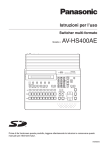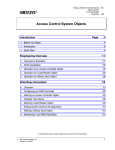Download User Guide
Transcript
User Guide AV-HS410 Plug-in Software ENGLISH W1211TY1042 –FJ VQT4G34-1 Live Switcher AV-HS410 Plug-in Software Contents <Overview>..........................................................................................................................3 <How to obtain the Plug-in Software>..................................................................................3 <How to register the Plug-in Software> ...............................................................................4 <How to start up the Plug-in Software> ...............................................................................5 <How to operate the Plug-in Software> ...............................................................................6 1. CAM_IP...........................................................................................................................6 1.1. Communication method............................................................................................................... 6 1.2. Verified models ............................................................................................................................ 6 1.3. Functions ..................................................................................................................................... 6 2. CAM_COM......................................................................................................................9 2.1. Communication method............................................................................................................... 9 2.2. Verified models ............................................................................................................................ 9 2.3. Functions ..................................................................................................................................... 9 3. P2 Remote ....................................................................................................................12 3.1. Communication port................................................................................................................... 12 3.2. Verified models .......................................................................................................................... 12 3.3. Functions ................................................................................................................................... 12 4. GVG Protocol ................................................................................................................13 4.1. Communication port................................................................................................................... 13 4.2. Verified models .......................................................................................................................... 13 4.3. Functions ................................................................................................................................... 13 5. AUXP_IP .......................................................................................................................15 5.1. Communication port................................................................................................................... 15 5.2. Functions ................................................................................................................................... 15 Abbreviations z Both SD memory cards and SDHC memory cards are described as “memory cards” in this manual. When individual descriptions are provided, they are featured individually. © Panasonic Corporation 2011-2012 - 2 - Live Switcher AV-HS410 Plug-in Software <Overview> By registering or installing the AV-HS410 Plug-in Software in the AV-HS410, the pan, tilt, zoom, focus and other functions of Panasonic’s commercial cameras (AW series) can be controlled from the AV-HS410. Furthermore, the AV-HS410 can be controlled from a remote control panel (VS-R45 made by Venetex) to perform crosspoint switching, AUTO transitions and other operations. <How to obtain the Plug-in Software> The Plug-in Software can be downloaded from “Service and Support” on the home page whose address is as follows: http://pro-av.panasonic.net/ The five Plug-in Software applications listed below can be obtained. 1. CAM_IP This application makes it possible to control the pan, tilt, zoom, focus and other functions from the AV-HS410 once a Panasonic professional camera (AW series) has been connected to a network. z The CAM_IP software runs in an AV-HS410 model whose system software version is V2.00.00 or later. If the system version of the AV-HS410 is earlier than V2.00.00, upgrade it to V2.00.00 or later. 2. CAM_COM This application makes it possible to control the pan, tilt, zoom, focus and other functions from the AV-HS410 once a Panasonic professional camera (AW series) has been connected with a serial interface (RS-422). z If the CAM_COM software version is V2.01 or later, it will run on an AV-HS410 model whose system software version is V2.00.00 or later. If the system version of the AV-HS410 is earlier than V2.00.00, upgrade it to V2.00.00 or later. 3. P2 Remote This application makes it possible to control the recording, playback and other operations from the AV-HS410 once a Panasonic P2 device has been connected with a serial interface (RS-422). 4. GVG Protocol This application makes it possible to have the crosspoint switching, AUTO transitions and other operations controlled once a remote control panel (VS-R45 made by Venetex) or editor (that supports the GVG100 communication protocol) has been connected with a serial interface (RS-422). The GVG100 communication protocol is supported. 5. AUXP_IP This application makes it possible to have the crosspoint switching, AUTO transitions and other operations controlled once a remote control panel (VS-R45 made by Venetex) has been connected with a network. z If the AUXP_IP software version is V2.00 or later, it will run on an AV-HS410 model whose system software version is V2.00.00 or later. Conversely, if the AUX_IP software version is earlier than V2.00, it will run on an AV-HS410 model whose system software version is earlier than V2.00.00. © Panasonic Corporation 2011-2012 - 3 - Live Switcher AV-HS410 Plug-in Software <How to register the Plug-in Software> Preparing for registration: 1. Have at hand an memory card with a memory size of at least 8 MB. z SDXC memory cards are not supported. 2. Initialize the memory card using the AV-HS410. 3. Insert the memory card initialized using the AV-HS410 into the memory card slot of the personal computer. 4. Download the desired Plug-in Software zip files and copy them onto the hard disk of the personal computer. 5. Unzip the downloaded zip files. 6. Copy the “HS410” folder onto the memory card. Do not change either the folder configuration or the filenames. Registration procedure: 1. Insert the memory card onto which the Plug-in Software was copied into the memory card slot of the AV-HS410. 2. Press the [PLUGIN] button. The Plug-in Software currently registered in the AV-HS410 is now displayed. Check the vacant index numbers. 3. Press the [VMEM/SD Card] button to light its indicator, and display the SD Card menu. 4. Use [F1] to display the File1 sub-menu. 5. Use [F2] to select Load in the Mode item and press [F2]. When [F2] is pressed, a file selection screen is displayed. 6. Use [F1] to select “Plug-in” for the type of file to be loaded at the SELECT item. 7. Use [F3] to select a vacant index number checked earlier. 8. Use [F4] to load (register) the Plug-in Software. Note: A warning message such as one shown below appears if Plug-in Software has already been registered in the index number selected above for registration. WARNING INDEX is in use. Please use another INDEX. (ErrNo=-01010) Please press F5 to close the message. In a case like this, repeat the registration procedure starting from step 7. Checking the registration: 1. Turn off the power of the AV-HS410 and then turn it back on again. 2. Press the [PLUGIN] button and check that the Plug-in Software has been registered. Notes: z Registered Plug-in Software can be deleted. For the deletion procedure, refer to section “4.5 Plug-ins” (<Operations and Settings> Operating Instructions). z Registered Plug-in Software cannot be saved from the AV-HS410 onto an memory card. © Panasonic Corporation 2011-2012 - 4 - Live Switcher AV-HS410 Plug-in Software <How to start up the Plug-in Software> 1. 2. 3. Press the [PLUGIN] button, and display the Plug-in menu. Use [F1] to select the Plug-in Software. The Plug-in name of the Plug-in Software registered is displayed on the sub menu. Use [F3] to select “On” for the Enable item. If “On” has been selected for the Enable item, the selected Plug-in Software has already started up. If “Off” has been selected for the Enable item, select “On”, turn off the power of the AV-HS410 and then turn it back on again. When the AV-HS410 starts up, the Plug-in Software starts up automatically. Notes: z If the Plug-in Software has not been started up, the screen will go black even when the menu screen of the Plug-in Software is opened. z The Plug-in Software will start up even when the AV-HS410 is operating in the Service mode. © Panasonic Corporation 2011-2012 - 5 - Live Switcher AV-HS410 Plug-in Software <How to operate the Plug-in Software> 1. CAM_IP This application makes it possible to control the pan, tilt, zoom, focus and other functions from the AV-HS410 once a Panasonic professional camera (AW series) has been connected to a network. z The CAM_IP software runs in an AV-HS410 model whose system software version is V2.00.00 or later. If the system version of the AV-HS410 is earlier than V2.00.00, upgrade it to V2.00.00 or later. 1.1. Communication method Connect the camera to be controlled to the LAN connector on the rear panel of the AV-HS410 using a LAN cable. Use a crossover cable when connecting the AV-HS410 and camera on a 1:1 basis. Note: The settings of the camera connected to the AV-HS410 must be matched with the network settings. Before connecting the units, set the IP address of the camera to be connected and the port number using the Network sub-menu. The camera cannot be connected to the AV-HS410 using a public line. 1.2. Verified models z AW-HE50 1.3. Functions Select the sub-menu concerned from the Plug-in menu and press [F2] (Open Menu) to display the menu of the Plug-in concerned. © Panasonic Corporation 2011-2012 - 6 - Live Switcher Sub-menu CamCTL1 CamCTL2 AV-HS410 Plug-in Software Item/ rotary encoder operated Function Cam-Menu [F2] This item is used to set whether the camera menus are to be displayed on an external monitor. On: The camera menus are displayed on an external monitor. Off: The camera menus are not displayed on an external monitor. Note: This setting only causes the control signals to be sent to the camera. It does not indicate that the actual statuses in which the camera menus are displayed on the external monitor. MenuOperation [F3] This rotary encoder is used when the cursor is to be moved using the camera menu. When it is turned clockwise, the cursor moves down; conversely, when it is turned counterclockwise, it moves up. It takes effect when “On” is selected for the Cam-Menu item. Notes: This rotary encoder can be operated when the AW-HE50 is used. It cannot be operated when the AW-HE100 or other camera is used. Power [F5] This item setting is used to control the camera’s power. On: The camera’s power is set to “On” from the standby mode. Off: The camera’s power is set to the standby mode from “On”. Note: This setting only causes the control signals to be sent to the camera. It does not indicate that the actual camera’s power status is displayed. Mode [F2] This is used to select the type of camera control to be exercised by the AV-HS410’s positioners. PanTilt: Panning is controlled by operating the positioner to the left or right. Conversely, tilting is controlled by operating the positioner up or down. Zoom/Focus: Lens focusing is controlled by operating the positioner to the left or right. Conversely, lens zooming is controlled by operating the positioner up or down. PTSpeed [F3] This is used to select the speed at which the camera pans or tilts or at which the lens is focused or zoomed. Fast: The operations are performed at the fastest speed. Middle: The operations are performed at the intermediate speed. Slow: The operations are performed at the slowest speed. AF [F4] This is used to select the type of control to be exercised over the focusing of the connected camera. Manual: The focus is controlled manually. Auto: The focus is controlled automatically. IRIS [F5] This is used to select the type of control to be exercised over the iris of the connected camera. Manual: The iris is controlled manually. Auto: The iris is controlled automatically. © Panasonic Corporation 2011-2012 - 7 - Live Switcher Sub-menu AV-HS410 Plug-in Software Item/ rotary encoder operated Function CamCTL3 MEM Preset [F2] This selects the memory in which the preset information of the camera is registered. None: Nothing selected MEM1: Use the memory registered in the [PLUGIN MEM1] button. MEM2: Use the memory registered in the [PLUGIN MEM2] button. Network IP Address [F2] This is used to input the IP address of the camera connected. Before connecting the camera, check its IP address and input it here. Port [F4] This is used to input the port number of the camera connected. Before connecting the camera, check its port number and input it here. z When the button for the memory previously selected in the MEM Preset item of the CamCTL3 submenu is pressed and its button is set to ON (lighted), the preset information of the commercial camera can be registered, played back or deleted. Press a number key (1 to 10) after pressing the [STORE] button. The preset information is registered in the number of the corresponding number key. Hold down the number key. Press a number key (1 to 10) after pressing the [RECALL] button. The preset information of the number corresponding to the number key is played back. Press a number key (1 to 10) after pressing the [DEL] button. The preset information of the number corresponding to the number key is deleted. Hold down the number key. ・ Up to 10 sets of preset information can be registered. ・ The registered preset information is held in the camera. The numbers of the number keys are used as the preset numbers by the camera. ・ The same preset memory can be selected in the CAM_COM software. When the same preset memory is selected for both programs, it will function in the one selected last. Note: When the power of the AV-HS410 is turned off, the PTSpeed, AF and IRIS settings are restored to their defaults. After turning on the unit’s power, these items need to be set again. © Panasonic Corporation 2011-2012 - 8 - Live Switcher AV-HS410 Plug-in Software 2. CAM_COM This application makes it possible to control the pan, tilt, zoom, focus and other functions from the AV-HS410 once a Panasonic professional camera (AW series) has been connected with a serial interface (RS-422). z If the CAM_COM software version is V2.01 or later, it will run on an AV-HS410 model whose system software version is V2.00.00 or later. If the system version of the AV-HS410 is earlier than V2.00.00, upgrade it to V2.00.00 or later. 2.1. Communication method Connect the camera to be controlled to the Com connector on the rear panel of the AV-HS410 using an RS-422 crossover cable. Select Config menu → COM-Port sub-menu → Mode item and set “1” for the item. 2.2. Verified models z AW-HE50 2.3. Functions Select the sub-menu concerned from the Plug-in menu and press [F2] (Open Menu) to display the menu of the Plug-in concerned. © Panasonic Corporation 2011-2012 - 9 - Live Switcher Sub-menu CamCTL1 CamCTL2 AV-HS410 Plug-in Software Item/ rotary encoder operated Function Cam-Menu [F2] This item is used to set whether the camera menus are to be displayed on an external monitor. On: The camera menus are displayed on an external monitor. Off: The camera menus are not displayed on an external monitor. Note: This setting only causes the control signals to be sent to the camera. It does not indicate that the actual statuses in which the camera menus are displayed on the external monitor. MenuOperation [F3] This rotary encoder is used when the cursor is to be moved using the camera menu. When it is turned clockwise, the cursor moves down; conversely, when it is turned counterclockwise, it moves up. It takes effect when “On” is selected for the Cam-Menu item. Notes: This rotary encoder can be operated when the AW-HE50 is used. It cannot be operated when the AW-HE100 or other camera is used. Power [F5] This item setting is used to control the camera’s power. On: The camera’s power is set to “On” from the standby mode. Off: The camera’s power is set to the standby mode from “On”. Note: This setting only causes the control signals to be sent to the camera. It does not indicate that the actual camera’s power status is displayed. Mode [F2] This is used to select the type of camera control to be exercised by the AV-HS410’s positioners. PanTilt: Panning is controlled by operating the positioner to the left or right. Conversely, tilting is controlled by operating the positioner up or down. Zoom/Focus: Lens focusing is controlled by operating the positioner to the left or right. Conversely, lens zooming is controlled by operating the positioner up or down. PTSpeed [F3] This is used to select the speed at which the camera pans or tilts or at which the lens is focused or zoomed. Fast: The operations are performed at the fastest speed. Middle: The operations are performed at the intermediate speed. Slow: The operations are performed at the slowest speed. AF [F4] This is used to select the type of control to be exercised over the focusing of the connected camera. Manual: The focus is controlled manually. Auto: The focus is controlled automatically. IRIS [F5] This is used to select the type of control to be exercised over the iris of the connected camera. Manual: The iris is controlled manually. Auto: The iris is controlled automatically. © Panasonic Corporation 2011-2012 - 10 - Live Switcher Sub-menu CamCTL3 AV-HS410 Plug-in Software Item/ rotary encoder operated MEM Preset [F2] Function This selects the memory in which the preset information of the camera is registered. None: Nothing selected MEM1: Use the memory registered in the [PLUGIN MEM1] button. MEM2: Use the memory registered in the [PLUGIN MEM2] button. z When the button for the memory previously selected in the MEM Preset item of the CamCTL3 submenu is pressed and its button is set to ON (lighted), the preset information of the commercial camera can be registered, played back or deleted. Press a number key (1 to 10) after pressing the [STORE] button. The preset information is registered in the number of the corresponding number key. Hold down the number key. Press a number key (1 to 10) after pressing the [RECALL] button. The preset information of the number corresponding to the number key is played back. Press a number key (1 to 10) after pressing the [DEL] button. The preset information of the number corresponding to the number key is deleted. Hold down the number key. ・ Up to 10 sets of preset information can be registered. ・ The registered preset information is held in the camera. The numbers of the number keys are used as the preset numbers by the camera. ・ The same preset memory can be selected in the CAM_IP software. When the same preset memory is selected for both programs, it will function in the one selected last. Note: When the power of the AV-HS410 is turned off, the PTSpeed, AF and IRIS settings are restored to their defaults. After turning on the unit’s power, these items need to be set again. © Panasonic Corporation 2011-2012 - 11 - Live Switcher AV-HS410 Plug-in Software 3. P2 Remote This application makes it possible to control the recording, playback and other operations from the AV-HS410 once a Panasonic P2 device has been connected with a serial interface (RS-422). 3.1. Communication port Connect the P2 unit to the Com connector on the rear panel of the AV-HS410 using an RS-422 straight cable. Select Config menu → COM-Port sub-menu → Mode item and set “2” for the item. 3.2. Verified models z AJ-HPM200 z AG-HPD24 3.3. Functions Select the sub-menu concerned from the Plug-in menu and press [F2] (Open Menu) to display the menu of the Plug-in concerned. Sub-menu Control1 Item/ rotary encoder operated Play Type of control over P2 unit Start playback [F2] Rec Start video recording [F3] Stop Stop video recording, stop playback [F4] Control2 Rec Pause [F5] Pause video recording Forward Fast forward [F2] Rewind Fast rewind [F3] © Panasonic Corporation 2011-2012 - 12 - Live Switcher AV-HS410 Plug-in Software 4. GVG Protocol This application makes it possible to have the crosspoint switching, AUTO transitions and other operations controlled once a remote control panel (VS-R45 made by Venetex) or editor (that supports the GVG100 communication protocol) has been connected with a serial interface (RS-422). The GVG100 communication protocol is supported. z There are no parameters on the sub-menus. 4.1. Communication port Connect the remote control panel or editor to the Editor connector on the rear panel of the AV-HS410 using an RS-422 straight cable. 4.2. Verified models z AG-A850 z VS-R45 (serial) 4.3. Functions Select the sub-menu concerned from the Plug-in menu and press [F2] (Open Menu) to display the menu of the Plug-in concerned. The AV-HS410 is subject to the following types of control from the remote control panel or editor. <Details of control> Bus switching The bus materials are selected from the following. ・A/B ・Key fill/key source ・DSK fill/DSK source ・PinP1, PinP2 ・AUX1 to AUX4 Button trigger (Pushbutton control) The same operations are performed as when the following buttons have been pressed on the control panel of the AV-HS410. ・Auto button ・DSK button ・WIPE button ・MIX button ・PinP1 button ・Pinp2 button ・Key button © Panasonic Corporation 2011-2012 - 13 - Live Switcher AV-HS410 Plug-in Software Forced button ON (Pushbutton lamp On control) The following functions are forcibly set to the “On” status. ・DSK ・FTB ・Key ・PinP1 ・PinP2 Forced button OFF The following functions are forcibly set to the “Off” status. ・DSK ・FTB ・Key ・PinP1 ・PinP2 Pattern switching The BKGD and KEY transition patterns are changed. Transition time change The following transition times are changed. ・BKGD ・Key ・DSK ・PinP1 ・PinP2 © Panasonic Corporation 2011-2012 - 14 - Live Switcher AV-HS410 Plug-in Software 5. AUXP_IP This application makes it possible to have the crosspoint switching, AUTO transitions and other operations controlled once a remote control panel (VS-R45 made by Venetex) has been connected with a network. z There are no parameters on the sub-menus. z If the AUXP_IP software version is V2.00 or later, it will run on an AV-HS410 model whose system software version is V2.00.00 or later. Conversely, if the AUX_IP software version is earlier than V2.00, it will run on an AV-HS410 model whose system software version is earlier than V2.00.00. 5.1. Communication port Connect the VS-R45 to the LAN connector on the rear panel of the AV-HS410 using a LAN cable. (Up to four VS-R45 units can be connected.) Use a crossover cable when connecting the AV-HS410 and VS-R45 on a 1:1 basis. 5.2. Functions Select the sub-menu concerned from the Plug-in menu and press [F2] (Open Menu) to display the menu of the Plug-in concerned. The AV-HS410 is subject to control exercised from the VS-R45(IP). For further details, refer to the operating instructions of the VS-R45. Notes: z The settings of the AV-HS410 and VS-R45 must be matched with the network settings. z The AV-HS410 and VS-R45 cannot be connected using a public line. © Panasonic Corporation 2011-2012 - 15 -

























